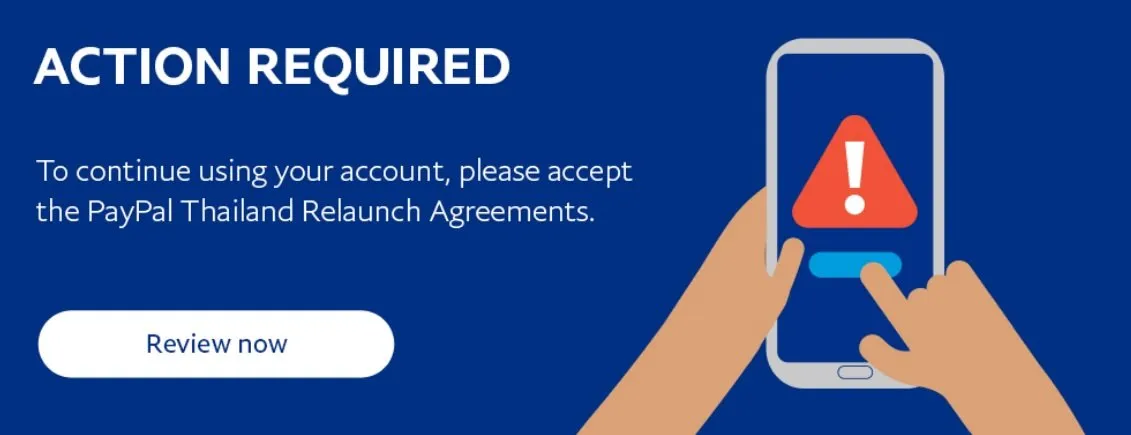It has caused a massive rumble through the expat world here in Thailand, and worried many Thai small businesses. The recently announced "relaunch" of PayPal Thailand in February of 2022.
Suddenly account holders everywhere are getting this notice when they log in:

SEEMS like a fairly innocuous & irritating "update your data" issue at first glance.
But, in fact, it's a HUGE shift that will knock out a large segment of Thailand's current "informal" and digital nomad sectors - everyone from Thai-owned shops selling cheap Asian goods online, to English teachers, webchat moderators, life coaches, online yoga teachers and people seeking to stay off the banking sector's radar. Reserving your unlicensed cute little beachside mom&pop bamboo hut online? Hmmm... not with PayPal, anymore. Sitting on the beach in Koh Pha Ngan and selling online with some nice Thai family fulfilling & shipping for you? Not a thing if you can't access the payments to pay the Thai people relying on you for cash.
In a nutshell, what are the changes?
- from February 2022, you will only be able to withdraw funds from PayPal into your Thai bank if you (a) have a registered Thai company bank account in exactly the same name as your PayPal account and (b) are registered for Thai tax and VAT. And in order to do that, you have to have a registered Thai business, which requires you to (a) employ 4 Thai nationals and pay social security for them and (b) be up to date with your Thai taxes.
- from February 2022, you will not be able to hold a PayPal balance if you do not comply to these same requirements.
- PayPal.co.th accounts will no longer be able to transfer money directly to US bank accounts accounts.
- 7% VAT will automatically be deducted from all PayPal Thailand transactions.
Thailand is the first South East Asian country to be making this move, but others (Vietnam in particular) are tipped to follow.
At first I thought it had no effect on me at all, since I actually HAVE a registered Thai public company and am able to meet the requirements. But when I logged in to pull down some funds from online sales, I also got that notice. Turned out they just wanted updated documents and for me to agree to some new Terms and Conditions.
As I begrudgingly scanned and uploaded my current Thai business documents yet again I realized that it's much more subtle than it appears. Firstly because I have to give the name, current address and passport/ID number of ALL my current shareholders (presumably so they can be dragged into the tax net). Secondly because being current with the tax office has now become a requirement of being able to accept online payments through PayPal.
I've never been a PayPal fan but it IS the most widely used merchant gateway in this part of the world. For interest's sake, I doodled around & looked at what other gateways might work with my online store, and there are several. But they all have the same, fundamental requirement: upload your current Thai company, tax and VAT information.
What's the global take home from this very local Asian news?
- Covid has gutted tax budgets around the globe and many countries, like Thailand, are looking for new tax revenue sources to replace other deficits, like tourism. Expect similar actions in other common digital nomad destinations soon!
The opportunity?
With gateways closing for withdrawing online revenue into hard cash without harsh transaction fees and serious tax implications, the OTHER GATEWAY is opening even more than before - for people to not only buy crypto for speculation and investment, but to more and more begin using it as a serious alternative currency.
2022 looks to be shaping up for the year crypto really hits its stride. I'm excited!! And hopeful, if a little irritated at the paperwork juggling for this single mama to stay afloat during times of constrained travel and trade.